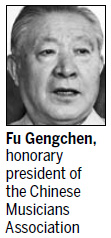Society
Songs proclaim glory of founding fathers
By Zhou Wenting (China Daily)
Updated: 2011-06-09 07:39
 |
Large Medium Small |
BEIJING - In honor of the 90th anniversary of the founding of the Communist Party of China, a concert setting the poetry of revolutionary figures to music was recently held at the National Center for the Performing Arts.
Fu Gengchen, who composed the music, said the performance was an opportunity to tell the Party "happy birthday".
Before the concert, Fu, who is 75, had immersed himself for three months in composing The Song of Mao Zedong, which draws its text from seven of Mao's poems.
"That was the first time the work was presented on the stage," said Fu, honorary president of the Chinese Musicians Association. "I feel delighted that it has won some warm applause."

Besides Mao's poems, the concert also presented works by Zhou Enlai, the first premier of the People's Republic of China, and Zhu De and Chen Yi, both commanders in the Chinese Communist military, as well as other revolutionary figures.
Fu said these poems are not only literary treasures but also reminders of how the revolutionary generation achieved success in the face of difficulties and portrayals of the revolutionaries' lofty beliefs and unswerving wills.
"I learned a lot when I composed music for these works," Fu said. "I often compare myself with these great men and consider what I would do if I were they."
Several of Fu's older songs were also heard in the concert, including Red Stars Lead Me to War and Chairman Mao's Words Light Up My Heart.
The latter song was composed in 1965 as an interlude for the movie Tunnel Warfare, which showed how soldiers and civilians in Hebei province had carried out underground warfare and attacked their enemies during the War of Resistance Against Japanese Aggression from 1937 to 1945.
"The original screenplay did not have an interlude," Fu said. "The director wrote 'upsurge of music that sounds like tidewater' on the shooting script. I made the change."
In the movie, the lead character, Gao Chuanbao, a militia leader and farmer, finds himself and his comrades in tunnels that have entrances but no exits, putting them in danger of being suffocated by their enemies. Desperate for guidance, Gao reads the book On Protracted War by Mao Zedong and suddenly understands that the Chinese forces will not be successful if they do nothing more than fight. They must also defend themselves.
"Considering Gao's state of mind, I thought the music should sound like a clear fountain flowing out of his heart," Fan said.
He composed a warm and encouraging tune, adding the lyrics himself: "The sun rises and lights the world The sun keeps us warm, and Mao's thoughts illuminate our hearts."
In 2004, Fu composed a magnificent song cycle, titled The Song of Xiaoping, to mark the 100th anniversary of the birth of the Chinese leader Deng Xiaoping. To find inspiration, Fu went to Nanchang, Jiangxi province, where Deng had lived for more than three years during the "cultural revolution" (1966-1976).
While in the city, Deng walked along a certain field trail every day.
"His thousands of walks on the path gave him an opportunity to incubate the thoughts that would eventually change the Party's policies for economic development and lead to a new age of reform and opening-up," Fu said.
"The song expresses his deep love for the motherland."
Fu has composed more than 1,000 musical works in the past decades. Among them are patriotic songs, orchestral music and songs for movies and TV dramas. Fu, a native of Shuangcheng, Northeast China's Heilongjiang province, joined the army at the age of 12. His time in the military has since proved to be an inexhaustible source of inspiration for his creative work.
Fu is happy that red songs, which praise both the spirit of revolution and the country, are being revived among the public.
"Red songs not only include revolutionary songs," Fu said. "Any music that reveals our national spirit, patriotism, reforms and innovation can be deemed a red song."
Despite his old age, Fu is still writing songs day in and day out. "This is what I cherish," he said. "It's my life."
| 分享按钮 |